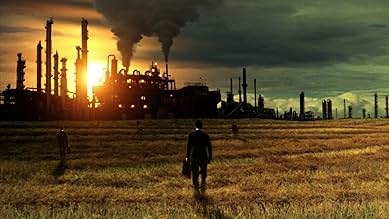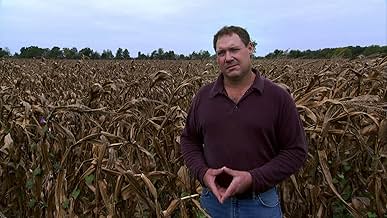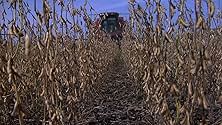Food, Inc.
- 2008
- Tous publics
- 1h 34min
NOTE IMDb
7,8/10
53 k
MA NOTE
Ajouter une intrigue dans votre langueAn unflattering look inside America's corporate controlled food industry.An unflattering look inside America's corporate controlled food industry.An unflattering look inside America's corporate controlled food industry.
- Réalisation
- Scénario
- Casting principal
- Nommé pour 1 Oscar
- 7 victoires et 20 nominations au total
Avis à la une
I recall a story where a teacher had tasked her students to draw a picture of a chicken for art class, and to her surprise, one of them drew a chicken fillet. I suppose the point here is that we've become so detached from the origins of our food sources, save for the form they take when already in the supermarkets, cured and prepared with ready to cook/eat processes becoming the norm of our daily lives. And with periodic cases of food scares and poisoning, this film takes a look throughout the food chain of today, and although it's rather US-centric, it still has plenty of relevance here since after all, we import almost everything.
With technological research applied to our food sources, be it the humble grain or to the meat to satisfy all us omnivores out there, the drive of course is to produce enough to feed all the mouths, although sometimes things get done out necessity, and spiral out of control when the pressure's there to produce food that can grow faster, fatter, and to shorten the time it takes to get to the dining table.
Directed by Robert Kenner, this is a documentary that followed some of the points that you would have become familiar with in films like Fast Food Nation, whose writer also provided an interview and laid the foundations of our predicament quite squarely on the MacDonald brothers, who had revolutionized the way food gets prepared, presented, and sourced. Kenner cleverly sections the film into digestible chunks, each focused on aspects of the food chain and the products themselves. The stark images and footage on how animals are treated as products in an assembly line subjected to the mass production (killing) process, will definitely shock you into thinking – that cannot be right, nor humane. Will it make you swear off meat? Probably.
In fact, the picture got painted in very bleak terms, where food conglomerates continue to grow in size and profits, resulting in the power they have over consumers, politicians and the likes, where choice and options are but a facade on shelves because the brands and products all belong to common parents. Corporations exists for profits, and are not responsible for consequences arising from their drive to make money. Everything else that resulted from that drive, whether or not a negative impact on society and human lives, can be considered collateral in their goal to feed the earth, and profit from it. Naturally, none of the conglomerate representatives wanted to be interviewed for the film, and that comes with no surprise, especially when their underhanded tactics in dealing with opposition, and corrupt practices get exposed through hidden cameras.
And in some ways, the film too makes you feel a little guilty for being part of the fuel on the demand side of things. With demand comes the opportunity to supply, and make money, and corporate social responsibility is still something relatively new as a buzzword that has plenty of room to be translated into action.
But the film is not all noise in complaining and presenting a doomsday scenario, and that's where the film earned merits in providing workable alternative solutions rather than just barking up a tree. It balanced the issues on what we could do, and engages the audience to be catalyst for change, making one realize that one has the power to skew demand to more acceptable methods of production, rather than one bred on convenience. It's not all serious nature here, as Kenner does inject enough well-placed humour into the documentary so that it doesn't come off as too heavy-handed in treatment, in pointing the loaded guns of blame onto others.
Food, Inc. is an incredible documentary about where our food comes from, and for those without an inkling of knowledge, it would be worthwhile to sit through this film and get some enlightenment. More importantly of course, is to take action to prevent our stomachs from becoming just repositories for Salt, Fat and Sugar. Highly Recommended.
With technological research applied to our food sources, be it the humble grain or to the meat to satisfy all us omnivores out there, the drive of course is to produce enough to feed all the mouths, although sometimes things get done out necessity, and spiral out of control when the pressure's there to produce food that can grow faster, fatter, and to shorten the time it takes to get to the dining table.
Directed by Robert Kenner, this is a documentary that followed some of the points that you would have become familiar with in films like Fast Food Nation, whose writer also provided an interview and laid the foundations of our predicament quite squarely on the MacDonald brothers, who had revolutionized the way food gets prepared, presented, and sourced. Kenner cleverly sections the film into digestible chunks, each focused on aspects of the food chain and the products themselves. The stark images and footage on how animals are treated as products in an assembly line subjected to the mass production (killing) process, will definitely shock you into thinking – that cannot be right, nor humane. Will it make you swear off meat? Probably.
In fact, the picture got painted in very bleak terms, where food conglomerates continue to grow in size and profits, resulting in the power they have over consumers, politicians and the likes, where choice and options are but a facade on shelves because the brands and products all belong to common parents. Corporations exists for profits, and are not responsible for consequences arising from their drive to make money. Everything else that resulted from that drive, whether or not a negative impact on society and human lives, can be considered collateral in their goal to feed the earth, and profit from it. Naturally, none of the conglomerate representatives wanted to be interviewed for the film, and that comes with no surprise, especially when their underhanded tactics in dealing with opposition, and corrupt practices get exposed through hidden cameras.
And in some ways, the film too makes you feel a little guilty for being part of the fuel on the demand side of things. With demand comes the opportunity to supply, and make money, and corporate social responsibility is still something relatively new as a buzzword that has plenty of room to be translated into action.
But the film is not all noise in complaining and presenting a doomsday scenario, and that's where the film earned merits in providing workable alternative solutions rather than just barking up a tree. It balanced the issues on what we could do, and engages the audience to be catalyst for change, making one realize that one has the power to skew demand to more acceptable methods of production, rather than one bred on convenience. It's not all serious nature here, as Kenner does inject enough well-placed humour into the documentary so that it doesn't come off as too heavy-handed in treatment, in pointing the loaded guns of blame onto others.
Food, Inc. is an incredible documentary about where our food comes from, and for those without an inkling of knowledge, it would be worthwhile to sit through this film and get some enlightenment. More importantly of course, is to take action to prevent our stomachs from becoming just repositories for Salt, Fat and Sugar. Highly Recommended.
It is said that if you like eating sausage, you better not see how it is made. If you like eating meat, don't watch an animal being killed. If you have your fill of fruits and vegetables daily, don't think about the pesticides that coat them.
Our modern society has sanitized the presentation of food so that we can blissfully ignore what we should be concerned with: where food comes from, how it is raised, picked, handled, altered, transported and sold. Instead our attention is focused only on the awesome number of beautiful packages on market shelves, the unblemished fruits and vegetables available year round. In our increasingly artificial world appearance trumps taste, price trumps provenance, and industrialization gives us a false sense of safety.
It is therefore opportune to have the release of "Food, Inc". After you see it, you'll probably not shop for food in the same way. You may even change the kinds of food you eat. Not enough to convince me to become a vegetarian, but the ubiquitousness of corn and its derivatives, stated multiple times in the film, has made scouring of package labels a routine. The easy rule of not buying anything that contains more than five ingredients more frequently obeyed.
The film contains material that has already been brought out by others, for examples, (1) the problem of genetically modified seeds crossing into properties that do not want them and (2) the appalling conditions in which farm animals are kept. Some material is stressed too much, for example, the whole issue surrounding the tragic death of a kid from a very virulent form of E.coli and the attempts to establish regulations that might prevent such deaths. Individual cases are worth mentioning, but systemic and widespread issues are more compelling. The death of one is no doubt a tragedy but the impairment of thousands is of greater social consequence.
The issue of food regulation in general is a subject that I would have liked to see more of. The adverse effect of more regulation (as per the example above) can be too much regulation. The subject is briefly broached by the "good farmer" (Joel Salatin) who kills his chickens in the open. Ironically those chickens are likely to be more healthy and tasty. Regulation may eliminate this practice. Regulation can therefore have a negative impact on food culture. One of the best example of this is preventing the importation into the US of many delicious young unpasteurized cheese from Europe or even the marketing of such cheese by US producers. How many get sick from those cheese compared to the number of sick from peanut butter or spinach?
The film unwittingly projects a bit of naiveté in a couple of places. The segment about an individual being sued by a food conglomerate and essentially losing for lack of money is not news. This is a capitalist system: more money, better lawyers, almost certain victory. Yet the point is well taken that the food conglomerates are behaving in thuggish ways and acting with the protection of a complicit government (the best money can buy). But again, uncontrolled capitalism generates monopolies and they will fight tooth and nail to retain control and squash any semblance of competition. It's the logic of the beast. This not limited to food. Since voting habits have brought the US to this state of affairs, our only recourse as consumers is to eat bananas, and only bananas, for breakfast, lunch and dinner. It's called the Chiquita Diet.
In any case, this is a must-see documentary. The director is to be commended for having the courage of tackling this very important topic.
Don't forget to buy a five gallon basket of popcorn dripping with oleo and a big soda with plenty of high fructose corn syrup before going into the screening room. It may be the last time you do.
Our modern society has sanitized the presentation of food so that we can blissfully ignore what we should be concerned with: where food comes from, how it is raised, picked, handled, altered, transported and sold. Instead our attention is focused only on the awesome number of beautiful packages on market shelves, the unblemished fruits and vegetables available year round. In our increasingly artificial world appearance trumps taste, price trumps provenance, and industrialization gives us a false sense of safety.
It is therefore opportune to have the release of "Food, Inc". After you see it, you'll probably not shop for food in the same way. You may even change the kinds of food you eat. Not enough to convince me to become a vegetarian, but the ubiquitousness of corn and its derivatives, stated multiple times in the film, has made scouring of package labels a routine. The easy rule of not buying anything that contains more than five ingredients more frequently obeyed.
The film contains material that has already been brought out by others, for examples, (1) the problem of genetically modified seeds crossing into properties that do not want them and (2) the appalling conditions in which farm animals are kept. Some material is stressed too much, for example, the whole issue surrounding the tragic death of a kid from a very virulent form of E.coli and the attempts to establish regulations that might prevent such deaths. Individual cases are worth mentioning, but systemic and widespread issues are more compelling. The death of one is no doubt a tragedy but the impairment of thousands is of greater social consequence.
The issue of food regulation in general is a subject that I would have liked to see more of. The adverse effect of more regulation (as per the example above) can be too much regulation. The subject is briefly broached by the "good farmer" (Joel Salatin) who kills his chickens in the open. Ironically those chickens are likely to be more healthy and tasty. Regulation may eliminate this practice. Regulation can therefore have a negative impact on food culture. One of the best example of this is preventing the importation into the US of many delicious young unpasteurized cheese from Europe or even the marketing of such cheese by US producers. How many get sick from those cheese compared to the number of sick from peanut butter or spinach?
The film unwittingly projects a bit of naiveté in a couple of places. The segment about an individual being sued by a food conglomerate and essentially losing for lack of money is not news. This is a capitalist system: more money, better lawyers, almost certain victory. Yet the point is well taken that the food conglomerates are behaving in thuggish ways and acting with the protection of a complicit government (the best money can buy). But again, uncontrolled capitalism generates monopolies and they will fight tooth and nail to retain control and squash any semblance of competition. It's the logic of the beast. This not limited to food. Since voting habits have brought the US to this state of affairs, our only recourse as consumers is to eat bananas, and only bananas, for breakfast, lunch and dinner. It's called the Chiquita Diet.
In any case, this is a must-see documentary. The director is to be commended for having the courage of tackling this very important topic.
Don't forget to buy a five gallon basket of popcorn dripping with oleo and a big soda with plenty of high fructose corn syrup before going into the screening room. It may be the last time you do.
Food, Inc is essential viewing even though it's not a great movie. Much like An Inconvenient Truth its facts and accumulation of information trumps style or overall craft. This doesn't mean that the director isn't making a bad film or doesn't have some clever visual cues and transitions or know how to combine interviews and archival footage, since he does. But it's the precious interviews he gets, and just leaving the theater knowing that American food (or just stretching worldwide) is run by four corporations and that the farming industry as is advertised as "the American Farmer" is in deep trouble.
It's separated into sections, and each one has something interesting. The one that got to me personally was the section on chickens, how they, like cows as well, are genetically engineered to get bigger a lot faster than they used to, and how the working conditions are at best hazardous and at worst untenable. We see one woman interviewed, the only one who bucked her corporate bosses, to let the cameras in to the state of the chicken coop. Even if one hasn't seen a regular chicken coop before, the state of this place, the stark and dark mis-en-scene, gives us a picture of how it is. As someone like myself who likes a good piece of chicken every now and again, it made me about as guilty as imaginable.
But perhaps that's part of the point of Food, Inc - get us informed to the point where we're scared s***less. The downside may be the reach; while Inconvenient Truth had the boost of a Vice President, the big names in this documentary are authors, one of which wrote Fast Food Nation (and, surprisingly, eats a hamburger on camera, from a diner of course, and speaks about how burger and fries are some of his favorite food to eat despite the horrors of the fast food industry). So it's difficult to say how many people will see this who don't already have some idea about the atrocious conditions in slaughterhouses, the outbreaks of E-Coli that affect countless people including little Kevin as seen in the film, and Monsanto's patent of a soybean seed that they genetically altered. Between that last part alone and a little factoid made about Supreme Court justice Clarence Thomas, it's no wonder one leaves the theater flabbergasted.
There is some hope the film provides, however. A Virginia farmer, who treats all of his livestock with care and feeds them right (not copious amounts of CORN, which, by the way, is practically coming out of your ears as you read this), gives a few moments to reflect on how the ideal of the American farmer, of what they can give to the community and how they can try and be reasonable with having to do the inevitable of killing living things for food. Hell, the director even has Wal-Mart's one really good moment in the documentary sun in years with its endorsement of organic products. But whatever you're own persuasion on food- be you a hardcore vegan or someone just coming from McDonalds before the movie starts- Food, Inc can make some sort of difference, if only for the information. I know I may not stop eating certain foods, but I'll never forget to give another look or a double take on what's in it- or what may not be there at all. This movie is good, valuable stuff.
It's separated into sections, and each one has something interesting. The one that got to me personally was the section on chickens, how they, like cows as well, are genetically engineered to get bigger a lot faster than they used to, and how the working conditions are at best hazardous and at worst untenable. We see one woman interviewed, the only one who bucked her corporate bosses, to let the cameras in to the state of the chicken coop. Even if one hasn't seen a regular chicken coop before, the state of this place, the stark and dark mis-en-scene, gives us a picture of how it is. As someone like myself who likes a good piece of chicken every now and again, it made me about as guilty as imaginable.
But perhaps that's part of the point of Food, Inc - get us informed to the point where we're scared s***less. The downside may be the reach; while Inconvenient Truth had the boost of a Vice President, the big names in this documentary are authors, one of which wrote Fast Food Nation (and, surprisingly, eats a hamburger on camera, from a diner of course, and speaks about how burger and fries are some of his favorite food to eat despite the horrors of the fast food industry). So it's difficult to say how many people will see this who don't already have some idea about the atrocious conditions in slaughterhouses, the outbreaks of E-Coli that affect countless people including little Kevin as seen in the film, and Monsanto's patent of a soybean seed that they genetically altered. Between that last part alone and a little factoid made about Supreme Court justice Clarence Thomas, it's no wonder one leaves the theater flabbergasted.
There is some hope the film provides, however. A Virginia farmer, who treats all of his livestock with care and feeds them right (not copious amounts of CORN, which, by the way, is practically coming out of your ears as you read this), gives a few moments to reflect on how the ideal of the American farmer, of what they can give to the community and how they can try and be reasonable with having to do the inevitable of killing living things for food. Hell, the director even has Wal-Mart's one really good moment in the documentary sun in years with its endorsement of organic products. But whatever you're own persuasion on food- be you a hardcore vegan or someone just coming from McDonalds before the movie starts- Food, Inc can make some sort of difference, if only for the information. I know I may not stop eating certain foods, but I'll never forget to give another look or a double take on what's in it- or what may not be there at all. This movie is good, valuable stuff.
"Faster, fatter, bigger, cheaper." A farmer describes fast food folly.
Although I would like to call Food, Inc. a horror film, I must relax my delicate eating sensibilities to call it a disturbing documentary. Images of little chickens hanging like laundry on conveyor cables above fast-moving assembly lines and cows patiently standing knee high in feces have changed my attitude toward grilling.
Robert Kenner's Food, Inc. isn't half the fun of a Michael Moore doc in which the infamous director savages everyone from auto execs to neocons. Kenner is more credible because he doesn't viciously pursue any one official, just the food industry itself (and McDonald's more than any other), which has become oligarchic and impersonal, endangering the quality and safety of consumers. Unlike Moore, Kenner has no sense of humor.
Like almost all documentarians, Kenner smartly offers ways to change the barbaric methods and marketing of food. In truth too little praise is given to the food giants that have provided good nutrition and cheaper food in an amazing harvesting that can feed the world. Narrator/interviewer Eric Schlosser (Fast Food Nation) and scientist Michael Pollan (UC Berkeley) modestly present their cases for food abuse such as the demand in corporations like McDonalds for "faster, fatter, bigger, cheaper."
On the point of treating animals with kindness, the documentary has encouraged me to consider vegetables.
Although I would like to call Food, Inc. a horror film, I must relax my delicate eating sensibilities to call it a disturbing documentary. Images of little chickens hanging like laundry on conveyor cables above fast-moving assembly lines and cows patiently standing knee high in feces have changed my attitude toward grilling.
Robert Kenner's Food, Inc. isn't half the fun of a Michael Moore doc in which the infamous director savages everyone from auto execs to neocons. Kenner is more credible because he doesn't viciously pursue any one official, just the food industry itself (and McDonald's more than any other), which has become oligarchic and impersonal, endangering the quality and safety of consumers. Unlike Moore, Kenner has no sense of humor.
Like almost all documentarians, Kenner smartly offers ways to change the barbaric methods and marketing of food. In truth too little praise is given to the food giants that have provided good nutrition and cheaper food in an amazing harvesting that can feed the world. Narrator/interviewer Eric Schlosser (Fast Food Nation) and scientist Michael Pollan (UC Berkeley) modestly present their cases for food abuse such as the demand in corporations like McDonalds for "faster, fatter, bigger, cheaper."
On the point of treating animals with kindness, the documentary has encouraged me to consider vegetables.
Greetings again from the darkness. Was reticent to see this one thinking I might never want to eat again. Much of what is in the film is not really new, but the entire segment on corn was really an eye opener.
No real surprise that a few giant companies, with governmental subsidies, control our entire food market ... and that it run like a giant factory and not Grandpa's farm. Still it is painful to watch what the workers and animals and farmers are subjected to.
The two messages we are left with - push the government for better controls and power by the FDA and USDA, and eat more organic food ... even if it is more expensive.
No real surprise that a few giant companies, with governmental subsidies, control our entire food market ... and that it run like a giant factory and not Grandpa's farm. Still it is painful to watch what the workers and animals and farmers are subjected to.
The two messages we are left with - push the government for better controls and power by the FDA and USDA, and eat more organic food ... even if it is more expensive.
Le saviez-vous
- AnecdotesOn the Region 1 DVD packaging, the UPC bar-code on the cow is different from the one shown on the theatrical poster. The bar-code on the poster is 4-73762-52481-6-(18). The bar-code on the Region 1 DVD packaging is 8-76964-00216-5 : the same bar-code that appears on the back cover of the DVD. As of 2022, the bar-code used on the poster is not an active code.
- Citations
Michael Pollan: There are no seasons in the American supermarket. Now there are tomatoes all year round, grown halfway around the world, picked when it was green, and ripened with ethylene gas. Although it looks like a tomato, it's kind of a notional tomato. I mean, it's the idea of a tomato.
- ConnexionsFeatured in Au coeur de la nuit: Tim Raue und Dave Arnold (2009)
- Bandes originalesSunny L.A.
Written by Nancy Peterson
Performed by Great American Swing Band
Meilleurs choix
Connectez-vous pour évaluer et suivre la liste de favoris afin de recevoir des recommandations personnalisées
- How long is Food, Inc.?Alimenté par Alexa
Détails
- Date de sortie
- Pays d’origine
- Site officiel
- Langue
- Aussi connu sous le nom de
- P.O.V. Food, Inc. episode #23.1
- Lieux de tournage
- Sociétés de production
- Voir plus de crédits d'entreprise sur IMDbPro
Box-office
- Montant brut aux États-Unis et au Canada
- 4 417 674 $US
- Week-end de sortie aux États-Unis et au Canada
- 60 513 $US
- 14 juin 2009
- Montant brut mondial
- 4 606 199 $US
- Durée
- 1h 34min(94 min)
- Couleur
- Mixage
- Rapport de forme
- 1.78 : 1
Contribuer à cette page
Suggérer une modification ou ajouter du contenu manquant
























